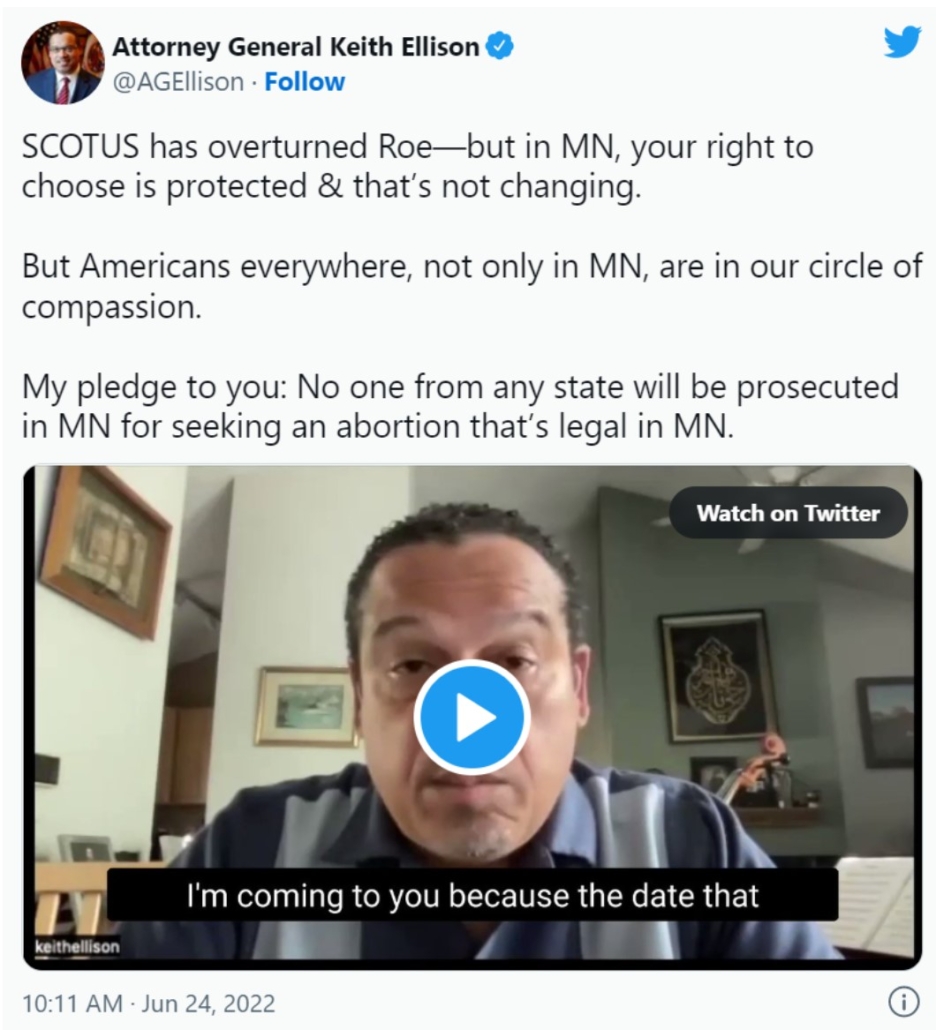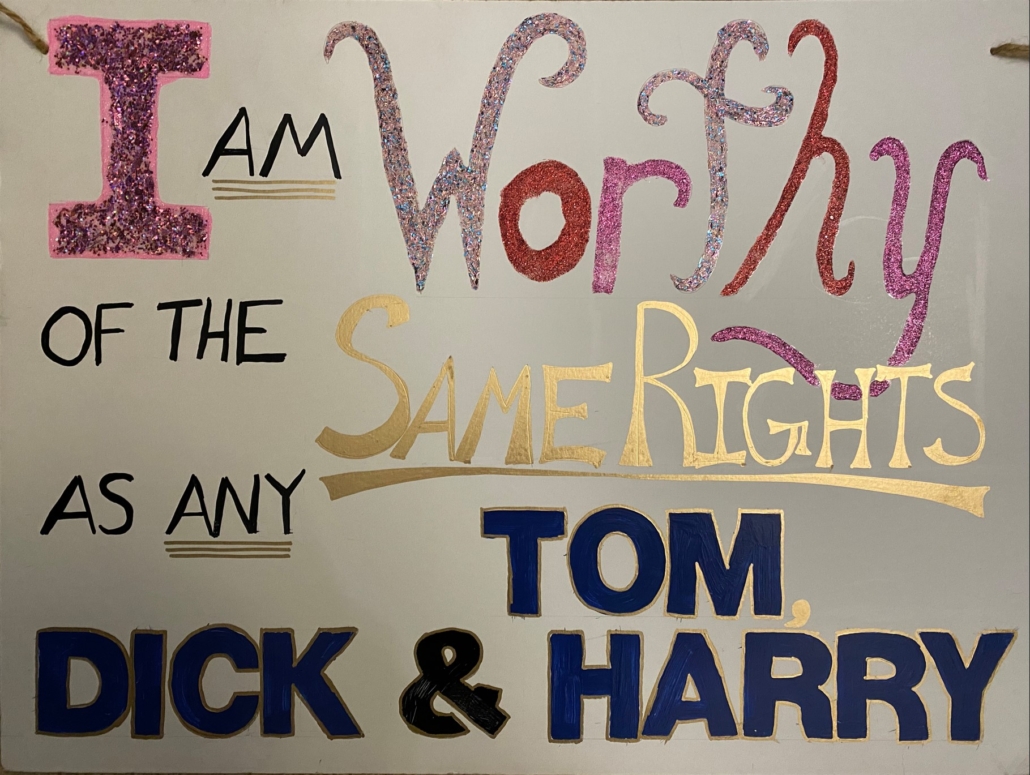I live in Minnesota, where the Attorney General has pledged not to charge a woman if she has an abortion. The Minnesota Supreme Courts’ 1995 decision in Doe v. Gomez preserves abortion rights in Minnesota for now. Still, anti-abortion groups are vowing to change that. Any law passed by the current Minnesota legislature protecting women’s right to abortion could be overturned if the party in power switches. It took less than three months after the decision before a Republican senator would propose a national abortion ban. So much for returning the decision to the states.
Justice Thomas indicated in his concurrent opinion that three other cases: Griswold v. Connecticut (1965, right to contraception), Lawrence v. Texas (2003, made same-sex sexual activity legal), and Obergefell v. Hodges (2015, established right to same-sex marriage). Interesting that he didn’t mention Loving v. Virginia in his list. Perhaps that hit too close to home for Justice Thomas.
I don’t feel secure in my rights. I don’t feel this country acknowledges me as an independent and fully functional human. The U.S. has a long history of treating women as less than a man. For the first time in nearly 50 years, women don’t have the same bodily autonomy that white heterosexual men have always had under the constitution.
Men can still decide if they want to be a father. They can still decide if they want to put their physical, emotional, and mental energy into raising the child they created. Women don’t have that choice after Roe. Now, the government can force a woman to carry the fetus to term, even if it dies along the way and kills her too. Women cannot choose where their mental, emotional, and physical energies will go. Even if they decide to give the child up for adoption, they are forced to invest energy, time, and life that men don’t.
If a woman has the resources to take the father to court, she might be able to get financial support from him. However, the onus is on the woman to make him take responsibility, requiring more of her energy, time, and resources. Ask any single mom if that is equitable. There are still ways for men to get around their responsibility, even if the courts rule he needs to support his offspring financially.
But hasn’t that always been the case? Women have always borne the responsibility of parenthood in a way men can’t. Women put their lives and health on the line to bear children. Women die in childbirth; men don’t. Society has historically shamed women for having children out of wedlock. There was a time when a woman would move with her child to an area where she was unknown and tell those in her new town she was a widow. People welcomed a widow with a child more than an unwed mother. It didn’t matter that the woman was taking responsibility and doing the best they could to care for her child. She was a pariah and outcast if she didn’t have a license to get pregnant. The man walked away and carried no shame or hardship for his participation in the creation of his child.
Our last names aren’t even our own. They are men’s names. The man’s lineage is carried forward, not ours. My last name is not my mother’s or my grandmother’s. It is a man’s name. My grandmother’s name was her father’s name. My great great grandmother’s name was her father’s. The women in my family historically only carry the name of men. Women are Miss or Mrs. depending on if they are married. There is no such notation for men. They are all always and forever Mr., bachelor or husband. Even in my lifetime, I saw women addressed completely with their husband’s name. Mrs. Aloysius Samson. Mrs. Lawrence Haslag. Indicating their belonging to their husbands rather than their own identity.
Women were likelier to wear a wedding ring until the 1940s. Men wore them as a reminder of their wives while they were off to war. Historically, women wore the symbol of marriage and fidelity, not men. Women were marked as taken, but not men.
Even our rape laws favor the rapist (often male) over the victim (usually female). State guidelines vary widely, and federal laws outline punishment ranging from a fine to life imprisonment, depending on the use of violence, age of the victim, or use of drugs to commit the rape. The difficulty lies in getting the conviction. Generally, society doesn’t believe a woman when a white man rapes her. Women are slut shamed, degraded, and defiled as they share their stories and search for justice. How a woman dresses, behaves, or exists in the world should not be considered when determining the guilt of the man who raped her.
Our language holds women to a standard men aren’t. Men play the field, but a woman is a slut. Boys will be boys, but girls must dress modestly not to tempt their male counterparts. A man works hard to be successful, but a successful woman must have slept her way to the top. A man is assertive, but an assertive woman is called a bitch. Unmarried men are bachelors, but unmarried women are spinsters or old maids. A man “never found the right woman,” but a woman “couldn’t keep a man.” I have heard the term homewrecker applied to women who sleep with married men far more than men who sleep with married women.
Five men and one woman took away the right to bodily autonomy for 168 million women who didn’t live in a state with abortion rights and jeopardized the right for millions more. Some states, such as my home state of Missouri, have trigger laws that went into effect as soon as the Dobbs decision was released. As a result, approximately 2.8 million female Missourian’s lost their bodily autonomy on June 24. Apparently, women aren’t capable of making all of their own medical decisions.
The overturning of Roe set women’s rights back decades and pissed off many people, myself included. We are tired of being demeaned, dismissed, and disrespected. We won’t go back.
We are worthy of same the rights of any Tom, Dick, and Harry…and we won’t stop until we have them.
The sign I carried in January 2018 when I participated in the Women’s March in St. Paul, MN.



